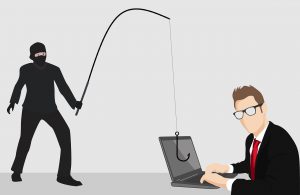No matter what kind of business you run, cybercrime is always a threat. But there are some very scary statistics surrounding cybercrime attacks in regards to small businesses: according to the 2018 Verizon Data Breach Investigations Report, 58% of cyber attack victims were small businesses. Not only that, but studies show that 60% of small businesses who needed to suspend operations after a cyberattack were never able to reopen.
You may be thinking that cyber security isn’t top of your list of priorities right now, but you could be making a very costly mistake. The recent focus on keeping businesses running while also keeping employees safe has actually meant a rise in cyber crime.
Working from Home

Face masks, social distancing, toilet paper shortages, everyone has felt the effects of the recent pandemic. One of the biggest changes to many people’s lives has been the switch from working in an office environment to working from home. In fact, according to an MIT study from early April, nearly 35% of people who were working pre-COVID19 were working from home by April. Add that to the roughly 15% of people who were already working from home and you have, by some estimates, close to 50% of the workforce working from home.
Time will tell whether working from home is here to stay, or whether we will all eventually head back to the office. While there are many who are skeptical that we will become a fully work-from-home economy, there are many who believe that the way we work is forever changed. According to Patricia Strach, interim executive director at the Rockefeller Institute, “this forced work-from-home experience is showing us that work-from-home arrangements are a viable strategy for many businesses and that this is likely to be true even after the crisis is over.”
The Risks
While there are many advantages to working from home, there are also drawbacks. One major disadvantage is that more employees working from home seems to equal a big rise in cyberattacks. One type of attack that is on the rise seems to be directly related to the recent pandemic: phishing expeditions. Businesses have reported receiving a huge amount of phishing emails, which are used to implant malware in a computer that can give hackers an opportunity to demand a ransom or steal data. The phishing links that employees most often clicked on were ones that claimed to be information about the coronavirus. Cybercriminals have been taking advantage of people’s hunger for information on the virus to gain access to business’ data. According to Marc Rogers, head of security at the long-running hacking conference Def Con and a vice president at security company Okta Inc., “I’ve never seen this volume of phishing. I am literally seeing phishing messages in every language known to man.” 
So many employees logging in from so many locations also poses a big problem. Without a strong virtual private network (VPN), or if employees are using public networks, then every time someone logs on they are exposing data to hackers.
Workers are also more likely to click on links or visit websites they wouldn’t normally visit in the office. Not only that, they are all downloading legitimate software like Zoom for meetings – and each time they do so, a cybercriminal has a chance to hack into a company’s computer systems and steal data and passwords. According to Darren McGraw, president of Mechelsen Private Client, “all of a sudden, [so] many employees are scattering and connecting from different directions. So this creates a great deal of opportunity for cyber criminals to jump in where maybe the business hasn’t had a chance to control.
Protecting Your Business

It is unfortunate that there are people out there who will take advantage of a crisis to try and make a quick (and illegal!) buck. But it is something that you and your business need to be prepared for. The first line of defense, is, of course, prevention. According to Lisa Lindsay, executive director of Private Risk Management Association, “Firms that will do the best if they’re hit with a cyber attack are the firms that have a robust cybersecurity plan in place that is continually vetted, reviewed and practiced so that employees know the standard operating procedure. If they believe that a breach has occurred or that they may have been infected, they know exactly who to call and what to do in a timely fashion.” In other words, be prepared.
But, as we have seen, unusual times such as we’ve experienced recently often mean that criminals will change their tactics or become more sophisticated. It is important to have the right insurance to protect you in case the worst does happen, because your general liability insurance excludes cybercrime. In these cases, you will need cyber liability insurance, which can cover damages to your customers as well as damages to your business.
You don’t need to go it alone when it comes to finding the right cyber liability insurance for your business. EZ.Insure is here to help, and will connect you to your own knowledgeable agent. With one of our agents, you never have to wonder if you’re going to get the right protection at the right price. To get started with us – for free – simply enter your zip code in the bar above, or you can speak to an agent by calling 888-615-4893.